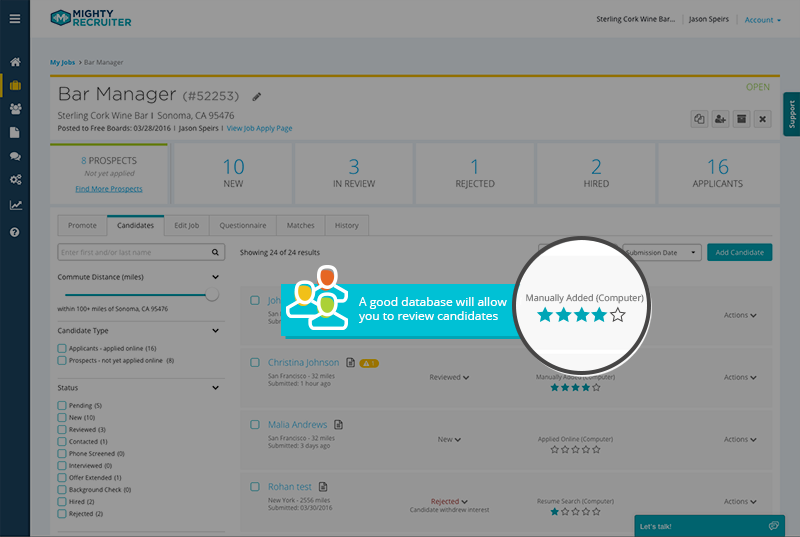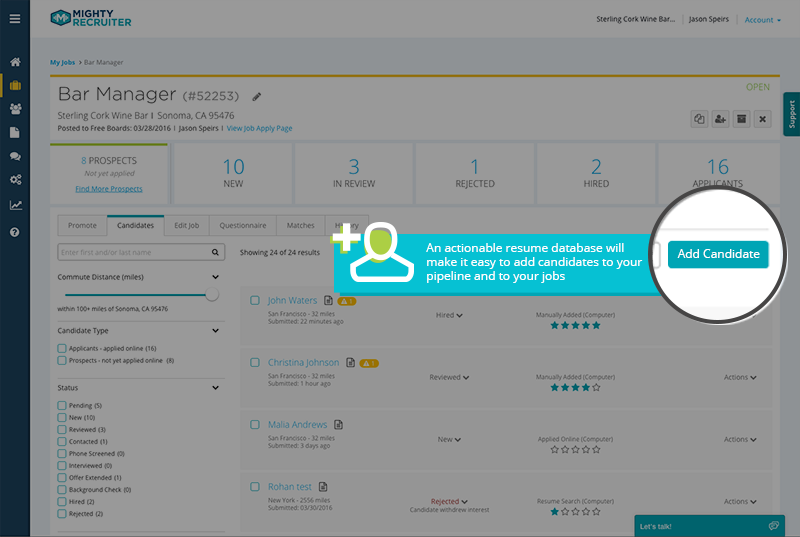An effective talent pipeline can mean you’re solving tomorrow’s hiring needs today. That’s not only efficient; it can also save recruiters and hiring managers a lot of headaches in the long run.
A good talent pipeline means that you’re not sitting around waiting for the right candidates to apply. You’re rather proactively going after the candidates you already know are right for the job. It’s also more important now than it’s ever been: unemployment rates are historically low this year, yet more companies are looking to hire in 2016 than 2015. Couple those statistics with the fact that over 70% of the talent pool is made up of passive candidates, and it becomes very clear that without talent pipeline – if you take the ‘waiting around for people to apply’ route – you could be waiting for a very long and very costly time.
Talent Pipeline Ground Zero: The Resume Database
So, talent pipelines are imperative to smooth hiring in today’s market, and one of the most obvious ways to start building this valuable asset is to utilize an actionable, relevant resume database. Resume databases, which are essentially third-party collections of publicly accessible resumes, are valuable to the pipeline because they allow you to source quickly and from beyond the limits of your own ecosystem.
In order for a resume database to be ‘actionable’, it needs to be more than a simple database. That is, a good resume database allows you to rate resumes, adding the good ones to your pipelines and leaving the duds behind. When a resume database can couple this function with the ability to map resumes to the relevant open positions, it becomes less of a passive resource to be mined and more of a valuable interactive tool (Check out MightyRecruiter’s resume database of 10 million resumes to see an example in action).

A standout resume database also gives recruiters the ability to keep track of high-quality candidates for whom there is no current opening, or those who weren’t appropriate for an immediate opening, but who could be a good fit at the company in the future. In that sense, a resume database allows every candidate to be an applicant first for the current opening, and second for a future role.

Finally, a solid resume database will incorporate easy search functions through filters (so you don’t have to be a boolean search ninja) and provide simple methods of contacting top talent in a database, so you can keep tabs on these candidates you might hire in the future.
In closing, here are 3 unique benefits of using a resume database you shouldn’t overlook:
- Hiring for Tomorrow, Today
Using a good and well-maintained resume database means that you’re anticipating future hiring needs and solving for problems, delays, and difficult hiring decisions before they appear.
- Quality, Quality, Quality
When you let the resumes come to you, there’s no telling what you’re going to get. No matter what the position or company, recruiting takes time – don’t waste it filtering through irrelevant and unqualified resumes.
- Less Burden on Recruiting Departments
Last, but certainly not least: a good resume database and talent pipeline makes for a more efficient recruiting department. For recruiters that means less headaches, less work, and better results. Everyone can get behind that.
The reality is that our present economy is a jobseeker’s market, and the latest jobs report makes that case even more obvious. A good job opening isn’t the diamond in the rough these days, but the qualified candidate is. No matter how exciting your company’s mission, no matter how lucrative the salary and supportive the benefits, no matter how high-profile you may perceive your firm to be, you need to be using a reliable resume database to find out-of-your network candidates to add to your talent pipeline.
 MightyRecruiter
MightyRecruiter




Leave a Reply